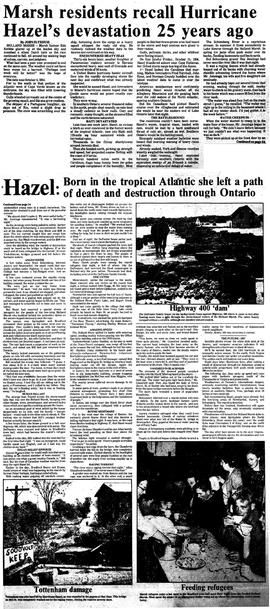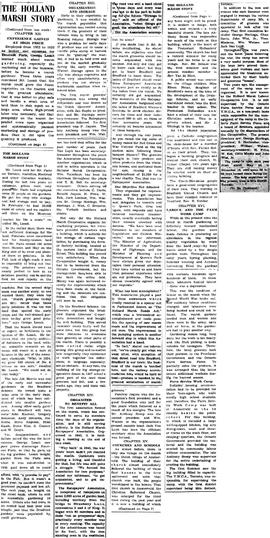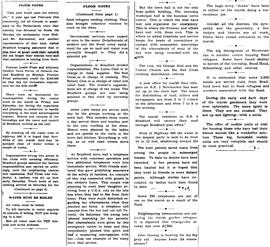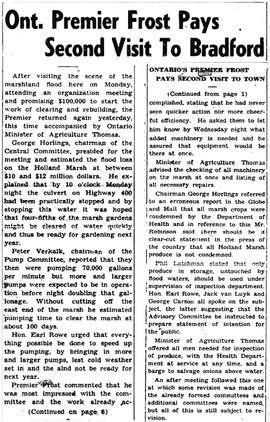Description : The Holland Marsh Story
(Continued from last week)
CHAPTER XII
EXPERIENCE GAINED AT HIGH PRICE
Employed from 1932 to 1935 as broker and salesman for Emerson Faris, George Losak learned much about marsh gardening, especially the marketing end of the business, before he became a marsh gardener. Those three years convinced Mr. Losak that the marsh could grow the finest vegetables on the market and in the greatest abundance; that it was better to play safe and handle a small area, where high-priced labor was necessary, and that prosperity on the marsh depended more upon organized and systemically planned marketing and storage of produce than it did upon the quantity it produced.
Mr. Losak sold for Mr. Faris on Toronto, Hamilton, Montreal and other Canadian markets. During his last two years as salesman, prices were very poor. "Mr. Faris has employed some 30 people on his gardens. He put his crop into storage and had storage rent to pay. In February, he had 30,000 cases of celery and we couldn't sell them on the Montreal market for 70c a crate," recalled Mr. Losak.
In the earlier days, there was not sufficient drainage for the land. Potatoes were considered best for freshly-broken land and Mr. Faris rented 100 acres from Manson and May on the Kind side of the river and planted them in potatoes. In the Fall, lack of roads made it next impossible to bring out that crop. The potatoes were as nearly perfect to look at as the potatoes possibly can be and the first lot sold rapidly on the markets. But the second shipment was another story, no one wanted them; they were too wet. "Marsh potatoes are 60% better than those early potatoes. It was too wet land that spoiled the early crops, and the well-drained gardens today grow good potatoes," says George Losak.
That the marsh should have an expert on fertilizers is the opinion of Mr. Losak. He believes that the yearly addition of fertilizers to the land, without scientific research on its needs will result in a lack of balance in the soil of the necessary chemicals. "Why, in 1934, we grew 540 crates of No. 1 lettuce on one acre," recalled Mr. Losak. "We could not do that today."
The late Job Morris was one of the early and successful gardeners on the Bradford Scheme. He owned quite a large area in the early days, most of which has been sub-divided into smaller gardens now. Among other early gardeners in Bradford still here were John Kacmar, Gregory Semenuk, Andy Simurds, Jos. Kulha, Steve Kapisak, Mike Kasik, Steve Kiss, S. Csamer and W. Desyk.
Yes, disappointment and failure paved the way for later success. George Losak saw poor prices discourage Emerson Faris, so that he gave up big gardens. Losak bought garden from the Faris area when it was sub-divided in 1936, paid down all he could afford with "a promise to pay" inthe Fall. But it wasn't a good year, he couldn't meet the promised payment and lost all. The next year, he bought on the canal bank, where he still is successfully gardening 10 acres. Others who had come in on rented land that year also bought, and thus the Bradford gardens were populated by small gardeners.
CHAPTER XIII
ORGANIZATION AND STORAGE
Early in their experience as gardeners, it was recalled by the marsh population that organization was needed among them if the products of their labours were to bring in fair financial returns. Storage was also a problem for early days. If produce was not to cause a terrific price slump at harvest time by "glutting" the market, it had to be held over and put on the market gradually during the early months of Winter. Storage space in the city was always expensive and often very unsatisfactory, as produce was not always in marketable condition when removed later.
The first marsh growers organization was among the Hollanders and was know as the Dutch Growers' Association, with Jan Rupke as president and Mr. Havinga secretary-treasurer. The Ratepayers Association followed. Its first president was P. Jaques. The late Anthony Sneep was the next president and Wm. Watson has held that office for the past number of years. Jack Van Luyk has been secretary-treasurer throughout the years the Association has functioned. Another organization which is still in active operation is the Holland Marsh Co-operative. Wm. Valenteyn has been its chairman throughout the years and T.E. Bell its secretary-treasurer. Others serving on the executive include C. Davis, Ronald Jaques, H. Prins, W. Eek, Jack Lindner, Wm. Watson, Sr., George Horlings, Wm. Horlings, J. Wist, C. Brouwer, the Verkaik brothers and others.
Not only did the Holland Marsh Cooperative organize for marketing purposes, but members provided themselves with a building which is suitable for th storage of certain vegetables, by purchasing the former factory building, located at the eastern limits of Holland Street. This building has proved very satisfactory. When the Co-operative bought it, money had to be borrowed from the Ontario Government, but the management has been able to pay back the entire debt. Money was again borrowed recently for improvements which have been made on the building and the directors are confident that this obligation will soon be met.
On the Bradford Scheme, the growers organized the Bradford Marsh Growers' Co-operative Association and bought the mill building. This served members needs fairly well for some time, but this group had more obstacles to overcome than growers on other parts of the marsh. There is possibly a more varied racial origin among this group and no matter how congenially they endeavour to work together the differences, in language especially, are an obstacle. At any rate, the realizing of the big storage co-operative dream in 1947 solved a great part of the need these growers had felts, and a few weeks ago, they sold their mill property.
CHAPTER XIV
ORGANIZED TO BENEFIT ALL
The first association formed on the marsh, which has continued to serve its members since the days of its organization, and is still serving actively, is the Holland Marsh Ratepayers' Association. Organized in 1940, it is holding a meeting at the end of this week.
"Way back" in 1940, the war years' boom hadn't yet reached the marsh. Gardeners were getting a living, and thankful for that, but life was still quite a struggle. "We formed the Association for two purposes," stated our informant, "to get acquainted and to get improvements."
The Ratepayers' Association is comprised of ratepayers on some 2,000 acres of garden land, including territory from the bridge to Strawberry Lane, concessions 3 and 4 of King. It began with 90 members and in these "not so prosperous" days, practically every member was at every meeting. The capacity of the school-house was taxed to its limit, with the men standing even in the vestibules. The road was still a hard climb in those days and every man was out to do his part in building for the future. "Strange to say," said an official of the Association, "when things got good the attendance fell off."
Did the Association accomplish its aims?
If you doubt it did, do some recollecting. As stated before, one objective was that the marsh growers should become acquainted with one another. Not only did they get to know each other, but they got to know Bradford and Bradford to know them. The ladies of Bradford should recall those Ratepayers' Association banquets just as vividly as do the ladies from the marsh. We certainly did get acquainted. The executive of the Ratepayers' Association bargained with the ladies of Bradford Women's Institute to serve chicken dinner for them and their ladies (around 200 in all) on three or four successive years. We certainly all became acquainted at those banquets.
And through the war years, do you recall the big sums of money raised for Red Cross and War Victims' Fund at the big auction sales, following those banquet dinners? The growers brought in their produce, and other products from the wholesale houses, and auctioned them for sale, raising in the neighbourhood of $1,000 for a war charity. Yes, that was the Ratepayers' Association.
One Objective Not Attained
They organized for improvements and they got improvements. This Association has sent delegates to councils and to Queen's Park, time and again, with requests and have received courteous consideration, usually eventually having their mission crowned with success. "We have been most fortunate in our members of Legislature and Cabinet Ministers," said our informant. "The Minister of Agriculture, the Minister of the Department of Highways, and the Minister of Planning and Development at Queen's Park have always given our deputation their personal attention. They have visited us and know from personal experience what are our problems. They have almost invariably agreed with our requests."
What has been accomplished? This Association played a part in these endeavours which finally resulted in a special Act in Parliament known as "The Holland Marsh Roads Act," which was a tremendous accomplishment and made possible the opening of of new marsh roads and the improvement of old ones. The improvement in the pumping system is another forward step in which this Association had a hand.
"In fact," stated our informant, "we've usually got what we went after, with exception of that direct road into Bradford. Bradford is our town; the business of the marsh is handled here, and the railway accommodation here would be hard to beat -- produce is handled to the greatest satisfaction of marsh growers."
Percival Jaques was the Association's first president and a good foundation was laid for the years which followed as a result of his energies. The late Mr. Anthony Sneep was the second president and Wm. Watson is the organization's present capable head. Jack Van Luyk has been the efficient secretary since the Association was formed.
CHAPTER XV
CHURCHES AND SCHOOLS
As stated before, there is only one village on the marsh -- the Dutch Village of Ansnorveld. The building of their church almost immediately followed the building of those first houses int he little settlement and until that church was built, the people worshipped in the homes. That first church in Ansnorveld, the Christian Reform Church, was enlarged for the third time during the past year and it is now a building of which any town might well be proud. It is modern in design, both within and without - a truly beautiful church. The late Anthony Sneep was responsible for much of the work on this building, which is the heart of the Protestant Hollanders' community. The church has had a resident minister for many years and his home is in the village. Rev. Mr. Schans was the first minister and the present resident minister is Rev. Van de Meer.
A public school was erected for the village children. Miss Eileen Nolan, daughter of Bradford's reeve at the time of the development of the Drainage Scheme, and an early marshland owner, was the first teacher in that school. The Protestant Hollanders now have a school of their own, the Christian school. This is a private school, and Mr. J. Uitolugt is the teacher.
As the church population grew, a Catholic congregation was assembled and this met in the school-house for a number of years, with Rev. Father Bolan as their priest. They, too, began a building program and erected their own church, St. James Chapel, two years ago. They are still raising money for interior work on their attractive building.
The Czech-Slovakian people have a good-sized congregation of their own. They worship in Bradford United Church and have their resident minister in Bradford, Rev. E. Velebir.
CHAPTER XVI
LABOUR AND THE FARM WORK CAMP
While at the present time the trend in marsh gardening is definitely toward mechanized labour, the gardens were made famous in producing an abundance in the highest quality vegetables by work done the hard way -- by busy hands aided by a few simple garden tools. Throughout the early years, Spring planting, Summer weeding and Autumn harvesting filled the gardens with workers, hundred upon hundred of them. In those days, labourers hunted labour -- there was a depression.
This was the condition of labour on the marsh when the Second World War broke out, and suddenly labour conditions changed, and labourers were being hunted and could not be found. The marsh gardens needed men and women and these were in the army, navy and air force, so the gardeners had to plan another way.
Gardening means long, busy days, but the work is not heavy, and, like fruit picking is quite suitable for teenagers. Therefore, the local growers took their problem to the Provincial Government and the Ontario Farm Service Force. To partially solve the problem, it was arranged that the latter secure additional workers during the harvest season.
Farm Service Work Camp
Suitable housing accommodation had to be provided for these teenagers, who were mostly high school students, and, therefore, the Farm Service Work Camp but built at Ansnorveld on the lot directly behind the public school. For this building, in which is included a large well-equipped kitchen, big airy dining-room, wash and shower rooms on the main floor, and sleeping quarters, the Ontario Government provided the material and the building was erected by community labour without remuneration. The late Anthony Sneep was supervisor for the entire undertaking of erecting the building.
The first Summer saw the big building filled to capacity. The Y.W.C.A., Toronto, was responsible for supervising the camp, with the first district supervisor being Mrs. Selbert, Toronto.
In addition to the men and women who each Summer were engaged to manage the various departments of camp life, a committee of growers was appointed to look after the camp. That first committee included George Horlings, Chas. Favis, John Wist, Jr., Thos. Miedema, Wm. Watson and Jack Van Luyk.
Throughout the war years, and the boom years following the war, the camp has served a very useful purpose. most of the boys have proved themselves good workers and have appreciated the treatment accorded them by their kindly and generous "bosses."
Two years ago, the management of the camp was reorganized. It is now known as the Holland Marsh Labour Co-operative Ltd. it is still supervised by the Ontario Farm Service Force and the Y.W.C.A., on a non-profit basis while responsible for the management of the camp in the Ontario Farm Service Force and a board of directors, appointed annually by the shareholders of the Co-operative. The present directors are: George Horlings, president; S. Hochretter, vice-president; William Watson, secretary-treasurer; H. Prins, W. Eek, Gillis Moritz and John Wist, Jr.
The camp is open each year from about May 24 to Novemeber 15, with some 50 to 60 boys housed there during the season. The lady supervisor at the present time is Mrs. Sheriff, Toronto.
(To Be Continued)





